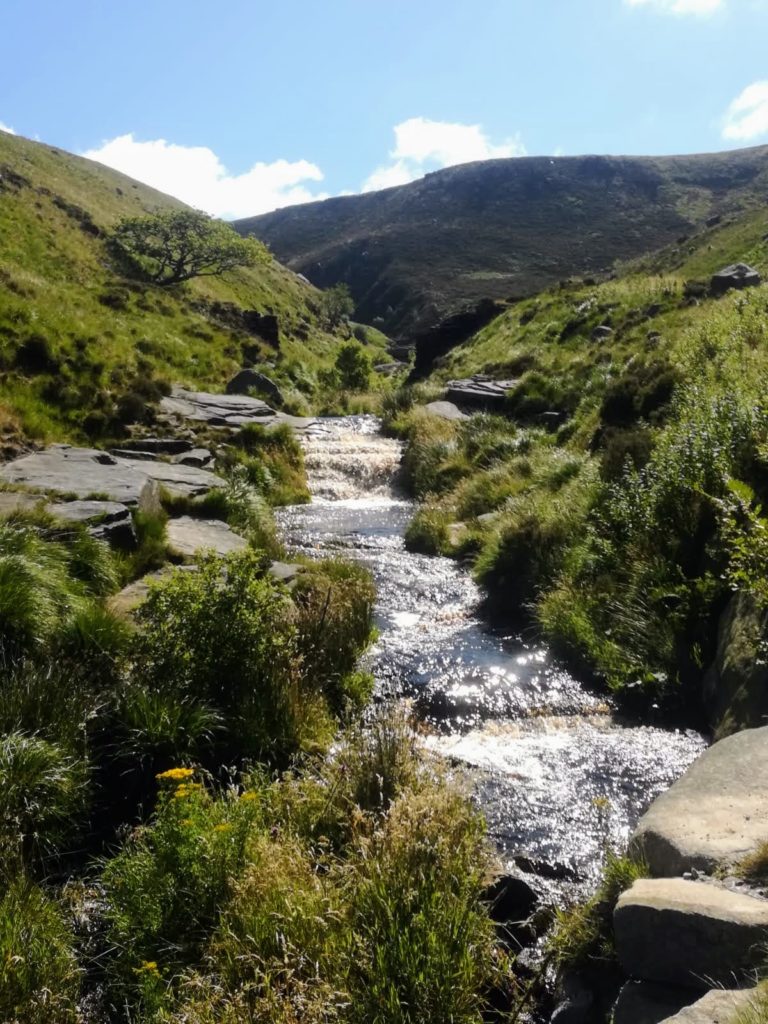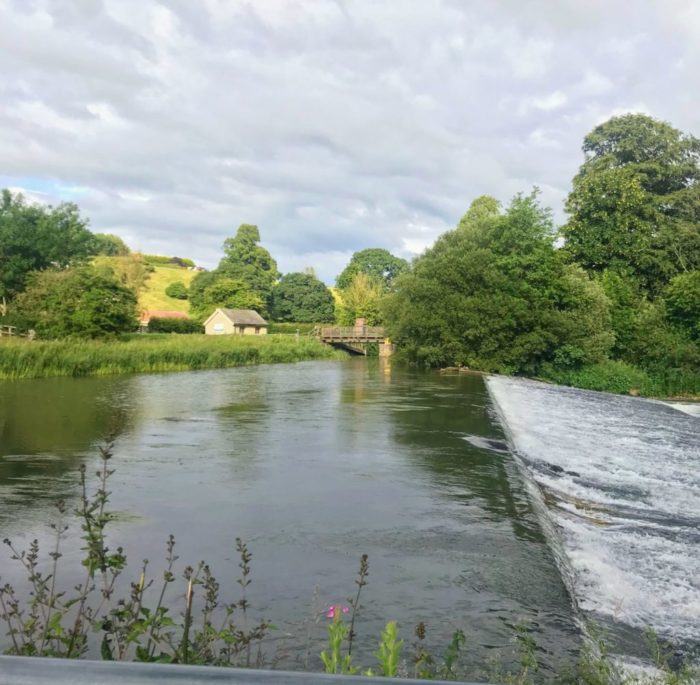New research will improve the quality of UK rivers

Five new research projects have launched to investigate how pollution impacts UK rivers. The projects form a UK wide Freshwater Quality Programme which is being co-ordinated by Programme Champions, Professors Joseph Holden and Pippa Chapman.
- Most UK rivers fail to meet good ecological status
- Scientists will: create new tools for monitoring freshwater pollution; study how river ecosystems are impacted by effluent, microplastics, chemicals and land management practices; support the development of new strategies to improve river water quality in the UK that will take account of climate change
- £8.4 million investment by the Natural Environment Research Council (NERC) and Defra
Freshwater ecosystems are facing multiple pressures from a cocktail of pollutants, including chemicals, microplastics, pharmaceuticals, invasive species and land management practices.
As a result, the majority of UK rivers fail to have good ecological status, with only fourteen per cent of waterways in England, 46 per cent in Wales, 50 per cent in Scotland and 31 per cent in Northern Ireland reaching the threshold.
Poor water quality can result in loss of aquatic invertebrates and fish, threaten the structure and stability of the aquatic food chain, be dangerous for bathing and lead to enhanced drinking water treatment needs and costs.
Researchers have been awarded funding by NERC and Defra from the £8.4 million Understanding changes in quality of UK Freshwaters programme to:
- investigate how pollutants enter, leave and interact with rivers and supporting ecosystems
- determine how the movement of pollutants will be modified with changes in the water cycle
- create better tools to monitor and measure pollution
Water Minister Rebecca Pow said:
"The stresses that are placed on our rivers are many and complex – from growing urban development to farming practices, increased diversity of chemicals and pharmaceuticals used by society, and pollution pressure from transport."
“We are going further and faster than any other government to protect and enhance the health of our rivers, including taking action to end the environmental damage caused by sewage spills."
“This funding is welcome. It will enable researchers to carry out vital studies monitoring and measuring pollution that find its way into our precious water courses. Monitoring the impacts of climate change will also be important. This knowledge will be used to improve the water quality in our rivers, bringing benefits now and into the future.”
The projects will study how:
- concentrations of multiple chemicals vary in freshwaters, using nine field catchments in Yorkshire (Rivers Aire, Calder, Derwent, Don, Nidd, Ouse, Swale, Ure and Wharfe)
- climate change impacts water quality of rivers
- freshwater pollutants affect aquatic invertebrates and plants (Thames and Bristol Avon field sites)
- livestock farming, its effluent and mitigation practices changes UK water quality. (Scotland, Wales, Northern Ireland and north and west England field sites)
- interactions will occur between changes in climate and land use, and emergent contaminants in rivers (includes River Almond study site, Scotland)
The programme’s Freshwater Quality Champions, Professor Pippa Chapman and Professor Joseph Holden, from the University of Leeds, said:
"There are huge water quality pressures on UK rivers. These are likely to be exacerbated with climate change."
"Through this innovative programme we will develop cutting-edge environmental science which is focussed on improving UK freshwater quality. Through collaboration between researchers, water and land managers and policy-makers, the programme will help ensure that our rivers and other waterways are more resilient to future climate and land-use change.”
Project summaries:
Assessing and Managing the Impacts of Mixtures of Chemicals on UK Freshwater Biodiversity in a Changing World
Led by Professor Alistair Boxall (University of York); Project co-leaders: Professor Lorraine Maltby (University of Sheffield); Professor Sim Reaney (University of Durham); £1,599,882
Using nine Yorkshire river catchments covering different land-uses and pollution pressures, this project will:
- investigate the most damaging chemicals being emitted into UK freshwaters
- characterise current (2002-2022) and future (2061-2080) chemical exposure and general water quality parameter profiles
- estimate the effects of chemicals on UK-relevant species
- predict the current and future effects of chemical mixtures on biodiversity and ecosystem function
- apply the findings to identify interventions to mitigate the impacts of chemicals on biodiversity now and under future climate and catchment change.
Field catchments: Rivers Aire, Calder, Derwent, Don, Nidd, Ouse, Swale, Ure and Wharfe.
LTLS Freshwater Ecosystems ("LTLS-FE"): Analysis and future scenarios of Long-Term and Large-Scale freshwater quality and impacts
Dr Victoria Bell and Dr Stephen Lofts, UK Centre for Ecology & Hydrology, £1,593,214
Historically, rivers across the United Kingdom have been subjected to a range of pressures arising from the input of chemicals and by-products, such as domestic wastewater, acid rain, nutrients and pesticides applied to soils, and other products such as medicines.
While some of these pressures have eased over recent decades, others (for example pesticides) remain and may be increasing. In addition to these pressures, climate change is also expected to impact on the quality and biodiversity of UK rivers.
The LTLS-FE project will develop a model to make predictions about future chemical inputs, river quality and river biodiversity, with future scenarios based on a range of possible changes in society and climate.
By doing this, we will provide a range of UK-wide 'projections' of future river quality and biodiversity which will support policy-makers in developing plans for adaptation, mitigation and detection of risks associated with future changes in river quality.
PAthways of Chemicals Into Freshwaters and their ecological ImpaCts (PACIFIC)
Led by Dr Daniel Read, UK Centre of Ecology & Hydrology, £1,597,089, including partners University of Bath - Professor Barbara Kasprzyk-Hordern, University of Oxford – Dr Michelle Jackson, Environment Agency – Dr Kerry Walsh.
Manufactured chemicals are essential for the maintenance of public health, food production, and quality of life, including a diverse range of pharmaceuticals, pesticides, and personal care products. The use of these throughout society has led to increasing concentrations and diversity of chemical pollutants in the environment.
This project will focus on understanding the link between the sources of chemical pollutants and their pathways, fate, and ecological impacts in freshwater ecosystems, with an emphasis on freshwater microbes and the ecosystem functions they perform.
The project will:
- Identify chemical pollutants that can modify the structure and function of freshwater microbial ecosystems.
- Understand the impacts that chemical pollutants have on the biogeochemical processes that freshwater microbes perform.
- Develop models to predict the scale of chemical pollutant threats to river ecosystems.
- Work with regulatory, industry and charity partners to develop solutions to manage the impacts of chemicals on freshwaters.
Field sites: the River Thames and Bristol Avon catchments, southern England, with locations chosen to coincide with Wastewater Treatment Works to understand how chemicals in sewage effluents contribute to chemical burden and ecological impacts across land use gradients.
Quantifying the combined nutrient enrichment, pathogenic, and ecotoxicological impacts of livestock farming on UK rivers
Professor Penny Johnes, University of Bristol, £1,599,731, with partners Professor C Tyler, University of Exeter, Professor A Binley, Lancaster University
Livestock farming is the dominant farming type and source of organic matter pollution in UK freshwaters, with over 9.65M cattle and 32.7M sheep on 10M hectares of grassland, representing 57% of all agricultural land in the UK.
When livestock excreta are flushed to waters it drives changes in their physical, chemical and ecological quality and function. This material contains inorganic nutrient contaminants typically included in routine water quality monitoring programmes across the UK, but also contains many other compounds which are not monitoring. These include nutrient-rich organic matter, pathogens, pharmaceuticals and hormones likely to drive significant damage to freshwater ecosystems, and presenting a persistent problem for recreational water use, fisheries and shellfisheries and drinking water abstracted from livestock farming catchments.
Climate change-induced increases in water temperature and alterations in flow regime will accelerate the biological processing of this material in freshwaters, while increased frequency of rainfall events predicted for the UK may overwhelm on-farm storage capacity, confounding efforts to reduce livestock farming impacts on UK freshwaters.
The project will deliver new understanding on how these stressors, environmental characteristics and management efforts interact to drive changes in UK water quality in livestock-dominated catchments.
Field sites: the Conwy, Bristol Avon and 50 further catchments across livestock farming regions in Wales, Scotland, Northern Ireland, and the north and west of England.
Monitoring, Modelling And Mitigating Pollution Impacts In A Changing World: Science And Tools For Tomorrow's Rivers
Led by Professor Andrew Tyler, University of Stirling, £1,599,996
For centuries, human activities have impacted our rivers by shifting the sources and combinations of physical, biological and chemical drivers and pressures. However, our understanding of their impact on ecosystems has been limited by viewing each in isolation and not considering their combined effects.
Significant reductions in some regulated pollutants (such as nitrogen and phosphorus) have been achieved in recent decades. However, even with these improvements, we are witnessing declining water quality of our rivers, and the resulting loss of freshwater species and biota.
Increasing numbers of new contaminants of concern (e.g. pharmaceuticals, pesticides, illicit drugs, micro plastics etc.) have emerged. This means that our freshwater species are being challenged by pollutant cocktails (mixtures) whose effects are poorly understood.
This project will address knowledge gaps around the effects of hydro-climatic and land use changes in combination with the different mixtures of chemicals on freshwater species.
Field sites: River Almond, Lothian.

